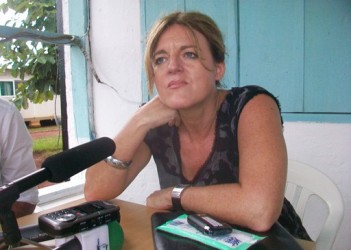UN mission in South Sudan cannot replace government
May 30, 2013 (JUBA) – The United Nations Mission in South Sudan said this week that it was not able to replace the role of the government in providing security to civilians in the young nation.

Marking UN peacekeeping day on 29 Ma, the head of the mission said that peacekeepers were trying to provide balanced protection to civilians in the troubled eastern state were 19,000 people have been displaced in recent months.
David Yauyau’s rebels are fighting to establish an independent state for ethnic minorities, he claims are being discriminated against in the young nation, which seceded from Sudan in 2011.
Hilde Johnson, the Special Representative of the Secretary General of the United Nations, said the mission has conducted well over 1,000 military patrols of long and short duration across Jonglei state since August last year.
“We have recently increased our military presence throughout the state to six companies, equally present in the areas of Jonglei’s three main communities (the Bor Dinka, Lou Nuer and Murle). We are not the peacekeepers of one community; we are the peacekeepers for all of them”, Johnson said.
The top UN official in the country, however, stressed that the mission cannot contain the whole conflict even if it were to deploy its “last pair of boots” to Jonglei, or other states facing security challenges, because peacekeepers were not in South Sudan to “replace the Government, the police or the military”.
“The primary responsibility to protect the population rests with the Government of the Republic of South Sudan. Like all UN Peacekeeping missions, UNMISS can only support the country’s institutions to help them fulfill their responsibilities as a sovereign state.
“We put at their service the resources that UN member states so generously give us to achieve the goal that they and the Government of South Sudan have set for us: to help consolidate peace and security, to help extend and consolidate the authority of the Republic throughout the entire territory of South Sudan, and to help establish the conditions for development”, Johnson explained.
Indian peacekeepers marked UN peacekeeping day in Bor, the capital of Jonglei state, on Wednesday by paying tribute to the five blue helmets and seven civilian members of UN staff who died in an ambush in April.
No group has accepted responsibility for the attack, which the South Sudanese military have blamed on Yauyau’s rebels.
“As we observe the International Day of the United Nations Peacekeepers on 29 May, we pay tribute to sixteen of our bravest colleagues who died in two senseless tragedies: the downing of an UNMISS helicopter on 21 December 2012 and an ambush on a UN convoy on 9 April. Among the dead were four Russian crew members, five Indian soldiers–who died while fighting to protect their colleagues–, and two South Sudanese civilians”, Johnson said.
The UN helicopter was shot down by the South Sudanese army (SPLA), who believed it be a Sudanese plane re-arming Yauyau’s rebels.
“Both tragedies happened in Jonglei, a state most afflicted by insecurity and instability and which is the focus of the UNMISS mandate to protect civilians” she said.
In the face of adversity the UN mission was following “the inspiring example of the people that it serves” by remaining resilient, her statement said.
“Last year, UNMISS received threats by anti-government armed elements against one of our bases in Pibor County. Our response was to increase our military presence in the county.”
Yauyau’s rebels briefly occupied Boma, a strategic town in Pibor county near the border with Ethiopia, earlier this month, before it was retaken by the SPLA.
(ST)
